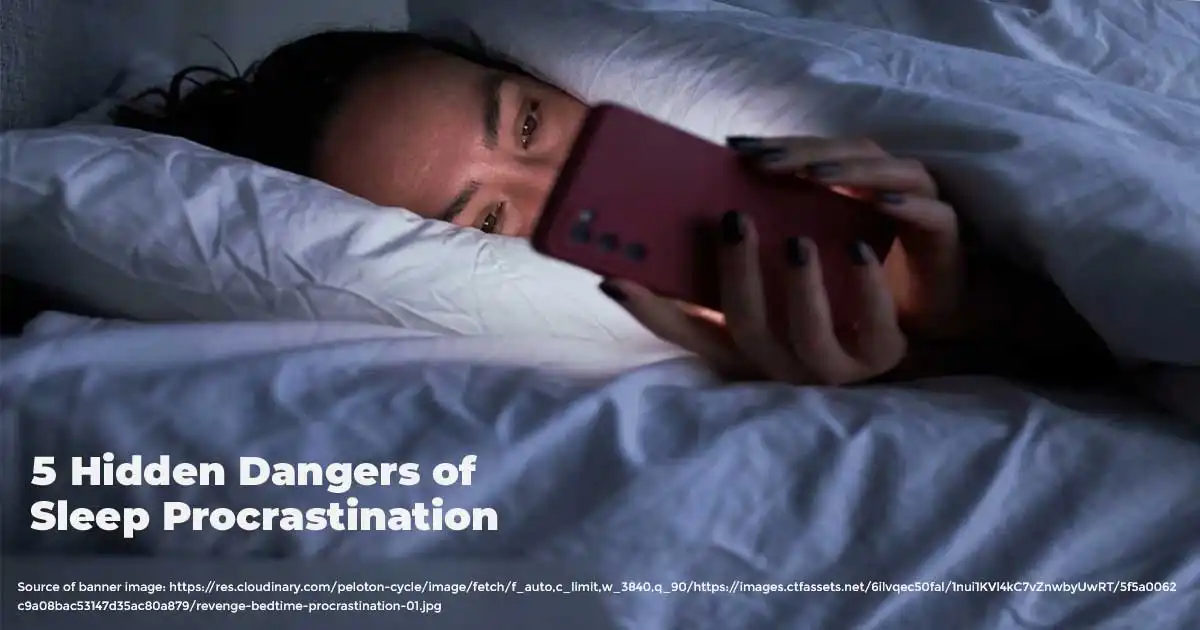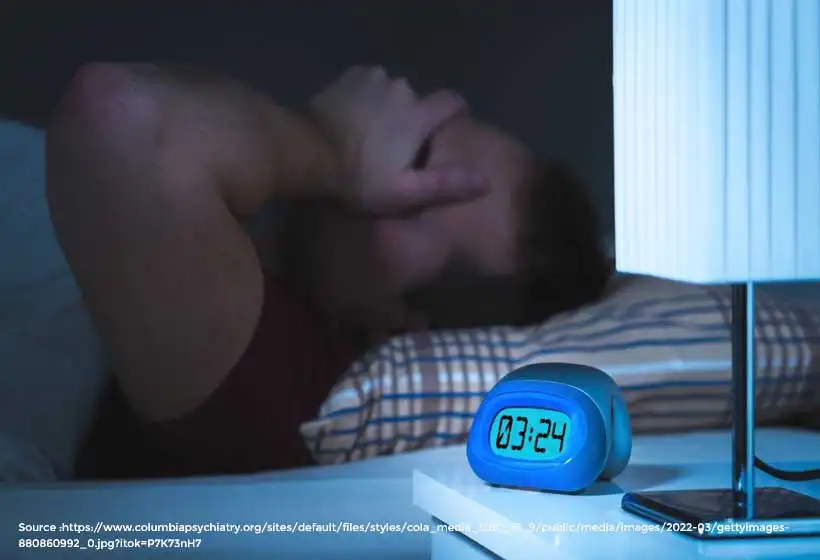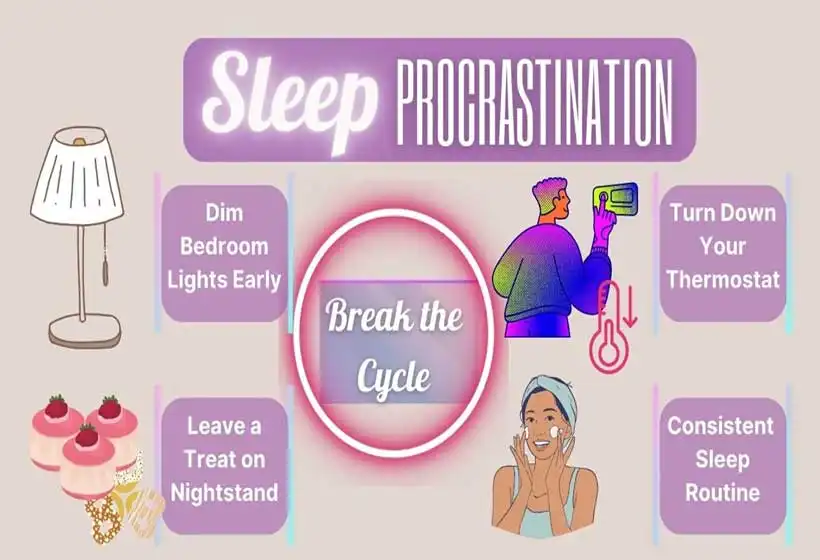5 Hidden Dangers of Sleep Procrastination

Key Takeaways
- Sleep procrastination happens when individuals delay sleep at the cost of their overall well-being.
- Bedtime Procrastination leads to reduced sleep, which can negatively impact both mental and physical health.
- Develop a consistent, relaxing nightly routine. Avoid stimulants like smartphones and caffeine, which can hinder your ability to fall asleep.
“Sleep Procrastination”, we’ve all gone through this! The clock ticks past bedtime, yet we find ourselves scrolling through social media.
This behavior is known as “sleep procrastination”. It is becoming an increasingly prevalent issue in today’s fast-paced society. According to a study, the majority of people in the U.S. (59.5%) reported procrastinating while in bed. The rest indicated they procrastinate before going to bed.
But what exactly is sleep procrastination? What impact does it have on our health?
Today, we’ll explore the world of sleep procrastination. We will discuss its causes, effects, and ways to overcome it.
What Is Sleep Procrastination?
Sleep procrastination refers to the act of delaying going to bed. It happens without a valid reason. While the need for rest is understood, sleep procrastinators engage in unessential activities. It includes binge-watching shows or mindlessly scrolling through their phones.
This delay isn’t always due to external demands like work or caregiving. However, rather a voluntary action that leads to a reduction in sleep duration.
Sleep procrastination often stems from two main reasons:
- Revenge Bedtime Procrastination: This is when individuals, particularly those with busy schedules, stay up late. It is a form of self-care or ‘revenge’ for not having enough time for themselves during the day.
- General Sleep Procrastination: This occurs when people put off going to sleep without an emotional or psychological motive. It is simply due to poor habits or distractions.
5 Hidden Dangers of Sleep Procrastination

Sleep is essential for overall well-being. Delaying sleep can lead to numerous negative consequences for both mental and physical health.
Here’s how sleep procrastination can affect you:
1. Sleep Procrastination and Sleep Deprivation
- The most obvious effect of sleep procrastination is sleep deprivation.
- You continuously push bedtime later and later. By doing this, you lose valuable hours of restorative sleep.
- It affects your cognitive functioning, mood regulation, and overall energy levels. Chronic sleep deprivation has been linked to a host of health issues.
- This includes an increased risk of heart disease, diabetes, and weakened immune function.
2. Mental Health Impacts of Bedtime Procrastination
- Lack of sleep due to sleep procrastination doesn’t just affect your physical health. It takes a toll on your mental well-being.
- Regular bedtime procrastination can lead to irritability, anxiety, and depression.
- A study has shown that people who experience chronic sleep issues are more likely to develop mood disorders, and their ability to handle stress diminishes.
3. Cognitive Decline due to Bedtime Procrastination
- When you delay sleep, this has an effect on your brain. You reduce the amount of time your brain has to process information and consolidate memories.
- This results in poorer cognitive performance.
- You may have difficulty concentrating, impaired decision-making, and slower reaction times.
- Over time, chronic sleep procrastination can lead to long-term cognitive issues.
4. Disruption of Circadian Rhythm and Revenge Bedtime Procrastination
- Your body follows a natural circadian rhythm. It regulates your sleep-wake cycle. When you constantly procrastinate sleep, you disrupt this internal clock.
- It makes it difficult to fall asleep at the right time and wake up refreshed. This can lead to insomnia.
5. Weakened Immune System due to Sleep Procrastination
- Sleep procrastination can weaken the immune system over time. When you consistently delay sleep, your body doesn’t get the necessary rest. This reduction in sleep decreases the production of cytokines.
- Cytokines are a protein essential for fighting infections and inflammation.
- As a result, your immune system becomes less effective at defending against common illnesses like colds, flu, and other infections.
- Chronic sleep procrastination impairs the body’s ability to recover. It leads to longer recovery times when you do get sick.
Study Finds How Sleep Procrastination Affects Sleep
Recent research has shed light on the impact of sleep procrastination. Sleep procrastination has an impact on the quality and duration of sleep. A study conducted by researchers from Utrecht University in the Netherlands. They have explored the relationship between bedtime procrastination and insufficient sleep. It has revealed some eye-opening results.
Key Findings:
- Significant Sleep Reduction
The study showed that individuals who frequently procrastinate their bedtime tend to sleep 30-60 minutes less. They sleep less per night than those who stick to a regular sleep schedule.
This might not seem like much. Over time, it adds up to a significant sleep debt.
- Reduced Sleep Quality
Participants who engaged in sleep procrastination reported lower sleep quality. They experienced more frequent awakenings. It leads to a cycle of fragmented, non-restorative sleep.
- Higher Risk of Daytime Sleepiness
Sleep procrastinators were found to be more prone to excessive daytime sleepiness. They were more likely to feel fatigued, irritable, and unmotivated during the day. It could negatively impact their work or school performance.
- Impact on Sleep Hygiene
The study highlighted a clear connection between sleep procrastination and poor sleep hygiene. Bedtime Procrastinators were more likely to use electronic devices in bed. They drink caffeine late in the day. Bedtime Procrastinators engage in stimulating activities right before bedtime. It hinders the ability to fall asleep easily.
What is good sleep hygiene? Read the top 10 tips to sleep better!
These findings emphasize that sleep procrastination is not just about losing a few hours of rest. It has deeper implications for both the duration and quality of sleep.
Causes of Sleep Procrastination
Sleep procrastination, sometimes referred to as “revenge bedtime procrastination,” describes the habit of delaying sleep to reclaim some sense of freedom. Experts have identified a few major reasons why people engage in sleep procrastination:
- Night Owls Living in an Early Bird World: When night owls try to fit into an early bird schedule, they may delay sleep to spend time on personal activities they missed during the day.
- Stress Relief: After a day filled with responsibilities, some may seek a sense of relaxation and leisure before bed. Scrolling through social media or watching shows can feel like a low-effort way to de-stress, leading to sleep procrastination anxiety as bedtime gets pushed back.
- Self-Control and ADHD: People with ADHD may find it especially challenging to wind down at night. ADHD can cause difficulties with time perception, hyperfocus, and self-regulation, making it harder to resist staying up. Rumination or impulsivity can also contribute to revenge bedtime procrastination, especially when combined with stimulation-seeking behavior common in ADHD.
How to Break the Cycle of Sleep Procrastination
Breaking the cycle of sleep procrastination requires a combination of effective sleep hygiene practices, self-reflection, and habit building. If sleep procrastination has been affecting your health and daily functioning, these methods can help restore a sense of routine and ease sleep procrastination anxiety.
- Set a Consistent Routine: Start by creating a sleep and wake schedule you stick to every day, including weekends. Over time, your body’s circadian rhythm will adjust, making it easier to fall asleep and wake up consistently.
- Reduce Screen Time Before Bed: Screens emit blue light that can delay melatonin production, disrupting the body’s natural sleep cycle. Turn off devices at least an hour before bed to encourage melatonin release.
- Practice Relaxation Techniques: Engage in calming activities before bed, like reading a book, doing gentle stretches, or meditating. These activities help counteract stress and can signal your body that it’s time to wind down, reducing sleep procrastination anxiety.
- Create a Comfortable Sleep Environment: Optimize your bedroom for sleep by ensuring it’s dark, quiet, and cool. Use comfortable bedding and keep electronics out of the room. This can make going to bed more appealing, countering the impulse to procrastinate.
- Shift Your Focus During the Day: Engage in activities that leave you feeling fulfilled and relaxed, so you don’t feel the need to reclaim “me-time” late at night. Prioritizing time for yourself during the day can reduce the urge for revenge bedtime procrastination.
- Mindfulness and Journaling: If overthinking and racing thoughts keep you awake, consider a brief journaling session before bed. Writing down your thoughts can alleviate worries and help you sleep more peacefully.
- Talk to a Doctor: For those with ADHD or those whose sleep procrastination stems from underlying conditions, a healthcare provider can offer sleep procrastination treatments or adjust medication to improve sleep quality.

Smart Take!
Lasting change comes from small, consistent actions. Start by identifying a single habit you’d like to shift. Choose a “sleep cue” to signal that it’s time to unwind, whether it’s a soft alarm or a breathing exercise. Remind yourself why better sleep matters, and connect with positive emotions that bedtime brings – a sense of calm, a chance to recharge. Celebrate each night you achieve your goal, reinforcing the cycle and helping you build the confidence to create a sustainable, sleep-friendly routine.
Sleep procrastination doesn’t have to control your nights. By focusing on your sleep habits and setting boundaries, you can break the cycle, ease sleep procrastination anxiety, and embrace restful, rejuvenating sleep. For more information on Sleep & Health browse on to Smartmattressbuy.com.
Disclaimer:
The information provided in this blog is for educational and informational purposes only and should not be considered medical advice. While we aim to provide accurate and helpful insights, sleep procrastination and its related impacts may vary widely among individuals and can be influenced by underlying health conditions. For diagnosis, treatment, or personalized advice, please consult a qualified healthcare professional. This blog does not replace professional medical guidance, and readers are encouraged to seek appropriate support for their unique health needs.
FAQs on Sleep Procrastination!
- What is sleep procrastination a symptom of?
Sleep procrastination often signals a lack of self-regulation, leading to reduced willpower and control. People who procrastinate sleep may feel restless, disinterested, and easily distracted, often resulting in dissatisfaction and difficulty focusing.
- How do you break sleep procrastination?
- Stick to a bedtime routine: Go to bed and wake up at the same time each day, including weekends.
- Limit screen time: Avoid screens for at least an hour before bed.
- Skip naps: If falling asleep is challenging, try avoiding naps during the day.
- Is sleep procrastination a symptom of ADHD?
Sleep procrastination, especially “revenge bedtime procrastination,” is common in people with ADHD. During the pandemic, it became widely discussed due to disruptions in sleep patterns caused by increased stress and irregular routines.
- What mental disorders can lead to procrastination?
Procrastination often relates to conditions like depression, anxiety, ADHD, and low self-esteem. It’s also tied to negative impacts on mental health, where high anxiety levels and poor impulse control are common.
- Is procrastination linked to ADHD or anxiety?
While procrastination itself isn’t a direct symptom of ADHD, ADHD traits, such as impulsivity and time management difficulties, can make procrastination more likely.
- How can I rewire my brain to stop procrastinating?
To retrain your brain:
- Prioritize high-importance tasks that require less time.
- Use a calendar (digital or paper) to block off time for these tasks over the next week.
- Why am I so tired but don’t want to sleep?
Feeling tired but not sleeping may indicate a disrupted circadian rhythm. Factors like anxiety, caffeine, blue light exposure, or even diet can cause this issue, along with conditions like sleep disorders or poor sleep habits.
- What is revenge scrolling?
Known as revenge bedtime procrastination, this habit involves staying up late scrolling on phones or social media, which can become an endless cycle of delaying sleep.
- What trauma might cause procrastination?
Trauma can contribute to procrastination, especially when rooted in early experiences of criticism or harsh treatment from caregivers. Such experiences can foster feelings of inadequacy that affect behavior.
- What is the root cause of procrastination?
Common reasons include:
- Anxiety or fear, such as fear of criticism.
- Overwhelm due to too many tasks and no clear starting point.
- Perfectionism, often avoiding tasks that aren’t “perfect.”
- Who is more prone to procrastination?
Studies suggest that men are slightly more prone to procrastination. This could relate to factors like lower self-control and impulsivity, possibly influenced by evolutionary traits.
- What does high-functioning ADHD look like?
Adults with high-functioning ADHD may experience common ADHD symptoms, such as missing appointments, struggling with time management, and frequently procrastinating.
- Does Adderall help with procrastination?
Many college students take Adderall, often prescribed for ADHD, to help reduce procrastination by improving focus and task initiation.
- What’s the biological reason for procrastination?
Procrastination is a result of our brain’s limbic system and prefrontal cortex interaction. The limbic system, which manages automatic responses, can often overpower the prefrontal cortex, which is responsible for planning and decision-making.
- How can I permanently overcome procrastination?
- Forgive past procrastination.
- Commit to your tasks.
- Reward yourself after completing tasks.
- Get accountability from others.
- Act as you go.
- Change your internal dialogue to be more positive.
- Reduce distractions.
